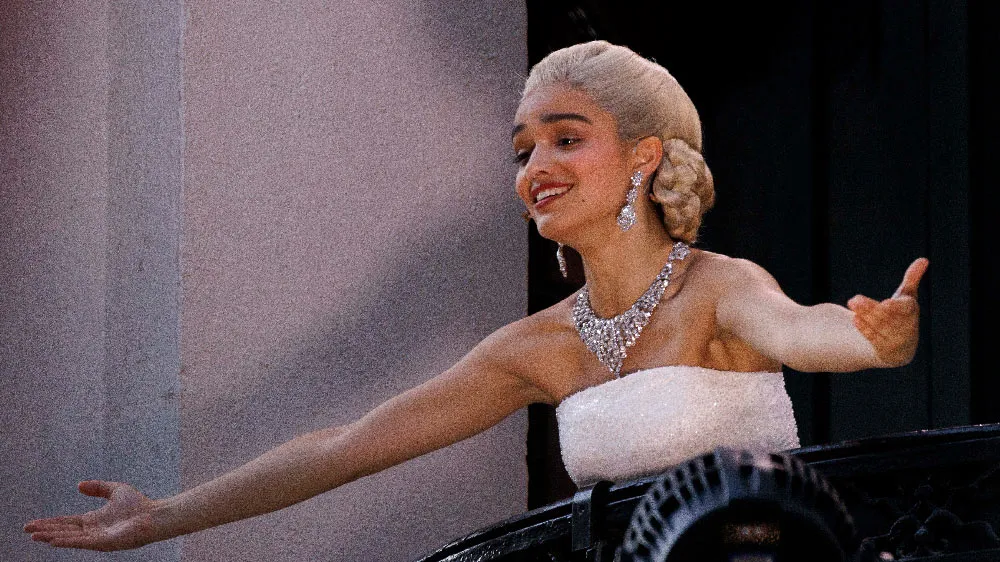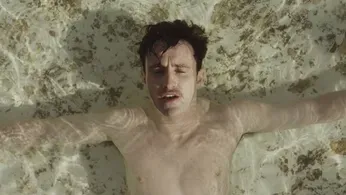
May 21
Is 'The History of Sound' the 'Brokeback Mountain' of 2025?
READ TIME: 11 MIN.
It's been 20 years since Hollywood produced one of the first mainstream films featuring two stars in a queer romance. They were Jake Gyllenhaal and Heath Ledger, and the film was "Brokeback Mountain." It was an enormous critical and financial success, grossing some $178 million worldwide against a budget of $14 million. These are the kind of numbers that would have guaranteed that similar themed films would be made. But only a handful of indies ("Moonlight," "Call Me By Your Name," "All of Us Strangers") have found release in the ensuing two decades.
"The History of Sound" is the latest and like "Brokeback," features two rising movie stars – Paul Mescal and Josh O'Connor. It is the fifth film from South African director Oliver Hermanus and is based on a short story by Ben Shattock (who also scripted). Set in the first part of the 20th century, it follows the relationship between two young men, Lionel (Mescal) and David (O'Connor), who meet as students at the Boston Music Conservatory in 1917. Lionel is a gifted singer, David wants to collect folk songs. After the First World War, they reunite when David invites Lionel on project where they would document folk music in rural America, and their romance blossoms.
The film premiered at Cannes on Wednesday and the early reviews are in, with many comparing it to "Brokeback Mountain." But is it a worthy successor to that seminal film. Here are some extracts from the first reviews:

In his rave review for Deadline, Pete Hammond writes: "On questionnaires for movie research screenings they always ask "Choose words that best describe the film." Okay, here are the words I would write down to best encapsulate the new film 'The History of Sound' which had its world premiere tonight in competition at the Cannes Film Festival: Meditative. Beautiful. Musical. Reflective. Heartbreaking. Love. Quiet. Soothing. Life Affirming. Haunting. Tasteful. Adult. Unforgettable...
"(T)he film itself, directed by Oliver Hermanus and written by Ben Shattock from his own short story, delivers. Hermanus also did the terrific remake of Kurosawa's 'Living,' and he has made a quietly masterful love story here containing a wonderful lead performance from Paul Mescal and an equally fine supporting turn by Josh O'Connor. It simply envelopes you into its unique world and washes over you with a songbook of America, and a lyrically haunting gay love story at its center, one that describes that person who will always be your great love, no matter how much time you had with them."
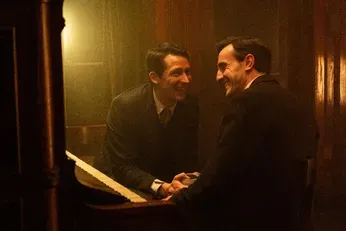
Source: MUBI
In Variety, Owen Gleiberman, was far less effusive:
"In 'Brokeback Mountain,' the two lead characters spent more time than not repressing who they were, and that turned the film into a tragedy. It's also one of the greatest movies ever made. Heath Ledger, speaking in a muffled drawl, showed you that a performance could be repressed and transcendent at the same time; his reticence broke your heart. By contrast, 'The History of Sound,' which might be described as a minimalist 'Masterpiece Theatre'-on-the-frontier riff on 'Brokeback,' is a drama that mostly just sits there. It's far from incompetent, but it's listless and spiritually inexpressive. It's 'Brokeback Mountain' on sedatives. . .
"Oliver Hermanus, the South African filmmaker who directed 'The History of Sound,' is working from a script by Ben Shattuck (who wrote the short story the movie is based on), and he tries to build a stately picturesque style around the spareness of Shattuck's dialogue. The film is quite handsome, full of woodsy earth tones and dark clothing, without any bright colors to get in the way of the meditative gloom. But the flow of images is more functional than poetic. I would describe the film's style as Kelly Reichardt with less precision.
"Hermanus is relying a lot on the aura of his actors, but in this case he only gets half of what he needs. Josh O'Connor, as the outwardly brash but inwardly secretive and vulnerable David, makes his presence felt in every scene. He's a pulsating star. But Paul Mescal, sporting a very mild Southern accent, never comes off like a kid from Kentucky. He's too formal, too bereft of folksy humor. There's a stillness to Mescal's performance that's just...still. It doesn't radiate anything. And that's part of what accounts, I think, for the crucial turning point in the story – the one that doesn't track on the film's own terms."
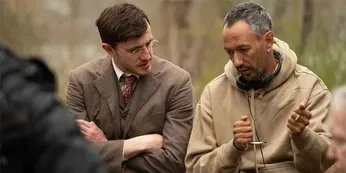
Source: MUBI
In the Hollywood Reporter, David Rooney calls the film a restrained but heartfelt queer love story.
"Paul Mescal and Josh O'Connor offer more proof that they are among the best contemporary actors we have in 'The History of Sound,' a resonant account of a tender but too-fleeting gay love affair interrupted by World War I. Adapted by Ben Shattuck from his jewel-like short story of the same name, the film's romance and heartache are intensified by the intimate experience the two men share of traveling the backwoods of Maine in 1919, collecting traditional folk tunes and ballads from rural people, essentially the equivalent in music of an oral history. . .
"The movie for many will be challengingly paced, as indicated by some walkouts during its first Cannes press screening. Comparisons with 'Brokeback Mountain' seem inevitable, and Ang Lee's beloved 2005 romantic tragedy remains in a class of its own.
But if you tap into 'The History of Sound's' soulful undercurrents, the soaring spiritual dimensions of the music – in songs more often about people than Divinity – and the depth of feeling in Mescal and O'Connor's performances, this is a film of lingering melancholic beauty. The power of the music alone makes it one of the most unabashedly romantic LGBTQ films in recent memory."
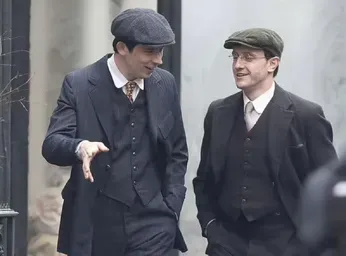
Source: MUBI
Jo-Ann Titmarsh writing for London's The Standard dismissed the film.
"The film moves around from the US to Rome to the UK and back, most of it seeped in the same murky hues (other than Rome, which allows a little golden warmth into the film). For a film about music and harmony, alas this story is pretty monotonous. Ironically, it is not helped by the score. Mescal and O'Connor put in fine performances here, but the problem lies in the screenplay and direction, which allows little joy or change of pace to muscle their way in. The story is trite and does not bear great scrutiny – for example, did impoverished rural farmers send telegrams to say someone was dying back then? When Oscar Coates, who wrote the score, moves away from the string sections and uses only voices, the film comes to life. At one point, the protagonist mentions 'a false note'. Despite the beautifully sung folk songs and the truly lovely and sympathetic lead actors, unfortunately that is precisely what this film is."
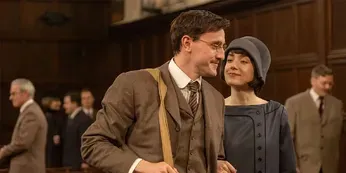
Source: MUBI
At ScreenRant, Graeme Guttmann was more positive.
"'The History of Sound' may have been one of the most hotly anticipated Cannes premieres and I'm sure many hoped it would be one of the hottest movies, what with two of the internet's preeminent boyfriends starring as lovers. It's not as steamy as one would hope – and those familiar with the work of director Oliver Hermanus probably saw that coming. Instead, it's a poignant meditation on the power of music, as corny as that might sound.
"But 'The History of Sound' is not corny. It's thoughtful and quietly devastating. In its insistence to buck conventions of the queer drama, though, it inevitably falls into some of the very traps it hopes to avoid, landing somewhere between expectations and the underwhelming pic it flirts with becoming."
At Collider, Therese Lacson sees the music as key to the film's success.
"One thing that became clear to me when watching 'The History of Sound' is Oliver Hermanus's dedication to folk songs and ballads. It is the star of the show and exists as the emotional anchor of the film. Every significant moment comes on the heels or right before a folk song; it is how David and Lionel first meet, it's how they bond, and it is ultimately Lionel's first love. It's rare to see so many classic folk songs and ballads highlighted in the way that 'The History of Sound' does. Normally, when music plays a large part in film, it is modern or classical music, or music made by geniuses and savants, sung by famous musicians with colorful pasts.
"But 'The History of Sound' lifts up the music of the people. Folk songs that are passed down from generation to generation, sung and written by everyday people. These songs are living culture, and they form the soul of the film. In the scenes that are the most emotional, in the moments that are the most impactful, a ballad is being sung or listened to. This is music with a history of its own, intensely regional yet also immensely universal. Hermanus doesn't just use this music as a backdrop for the love story between David and Lionel – it's an active participant. And because of that, it is that much more impactful. . .
"'The History of Sound' primarily revolves around Paul Mescal and Josh O'Connor, with the protagonist being Mescal's Lionel. The two actors have a tense romantic chemistry that is immediately reminiscent of Heath Ledger and Jake Gyllenhaal in 'Brokeback Mountain.' However, their romance is fully realized, and in the moments when they're together, the two characters are honest and open with each other. Both Lionel and David can be very closed off to the people around them, but with each other, it is different. . .
"It's only when the story turns back to the folk music, and we are drawn back into the past, that the film lands on solid ground again. Despite the meandering middle portion, 'The History of Sound' starts strong and ends strong. The emotional culmination of events comes in the final act, which had me bursting into tears in the theater as we listened to an older Lionel talk about his past. Artfully combining song, romance, and unique settings, Oliver Hermanus offers a heartbreaking and emotional film that reminds us not only of the enduring nature of love but also the power of sound and song."

Richard Lawson in Vanity Fair, was also mixed on the film.
"How much stifled yearning can one gay period drama take? That's a question confronted by Oliver Hermanus's new film 'The History of Sound,' which premiered here in Cannes on May 21. The film, based on a short story by Ben Shattuck, is about two young men who first meet in 1917, just before America heads to war. Those were certainly repressive times for queer people–yet music conservatory students Lionel (Paul Mescal) and David (Josh O'Connor) fall into bed together rather easily, bonding over their shared love of American folk music and no doubt drawn to each other's considerable good looks.
"Hermanus doesn't show us anything particularly steamy, but he does successfully create an air of quiet ardency, especially coming from Lionel. David, the orphan of a wealthy Newport family, is a bit more coy in his affections, while Lionel–who grew up in rural Kentucky before a singing scholarship brought him to study in Boston–looks at David with bedazzled wonderment. But Lionel is a quiet fellow, and the wealth of affection he feels for his friend and lover is never spoken aloud. Soon, the two are separated by war. When a haunted David returns from the trenches, he invites Lionel on a trip around rural Maine, where they will spend their days recording local singers and their nights rolling around together in a tent.
"The tent stuff does, inevitably, bring to mind 'Brokeback Mountain,' another restrained, handsomely staged drama of gay men in harsh times. But History of Sounds is on an even lower simmer than that film, asking its audience to sustain themselves mostly on loaded looks and hushed subtext. At times, Hermanus's style is effective, selling us on the film's lonely, years-spanning heartsickness. But too often the film's muted emotion feels more gimmicky than credible to Lionel and David's circumstances, particularly because Hermanus is so demure about sex; we barely even see the men kissing. Maybe Hermanus is harkening back to a storytelling era when homoeroticism did have to exist as mere suggestion, but 'History of Sound' plays more as overly mannered pastiche than worthy contributor to that tradition.
"Which isn't to say that the film is without power. As it glides toward its bittersweet conclusion, and Chris Cooper enters the picture as an elderly Lionel, the movie's air of impossible ache becomes potent. It successfully connects romance and music, arguing that Lionel and David's love was its own kind of eternal folk song–that the small clamor and motion of all of our lives is part of some grander human symphony."
